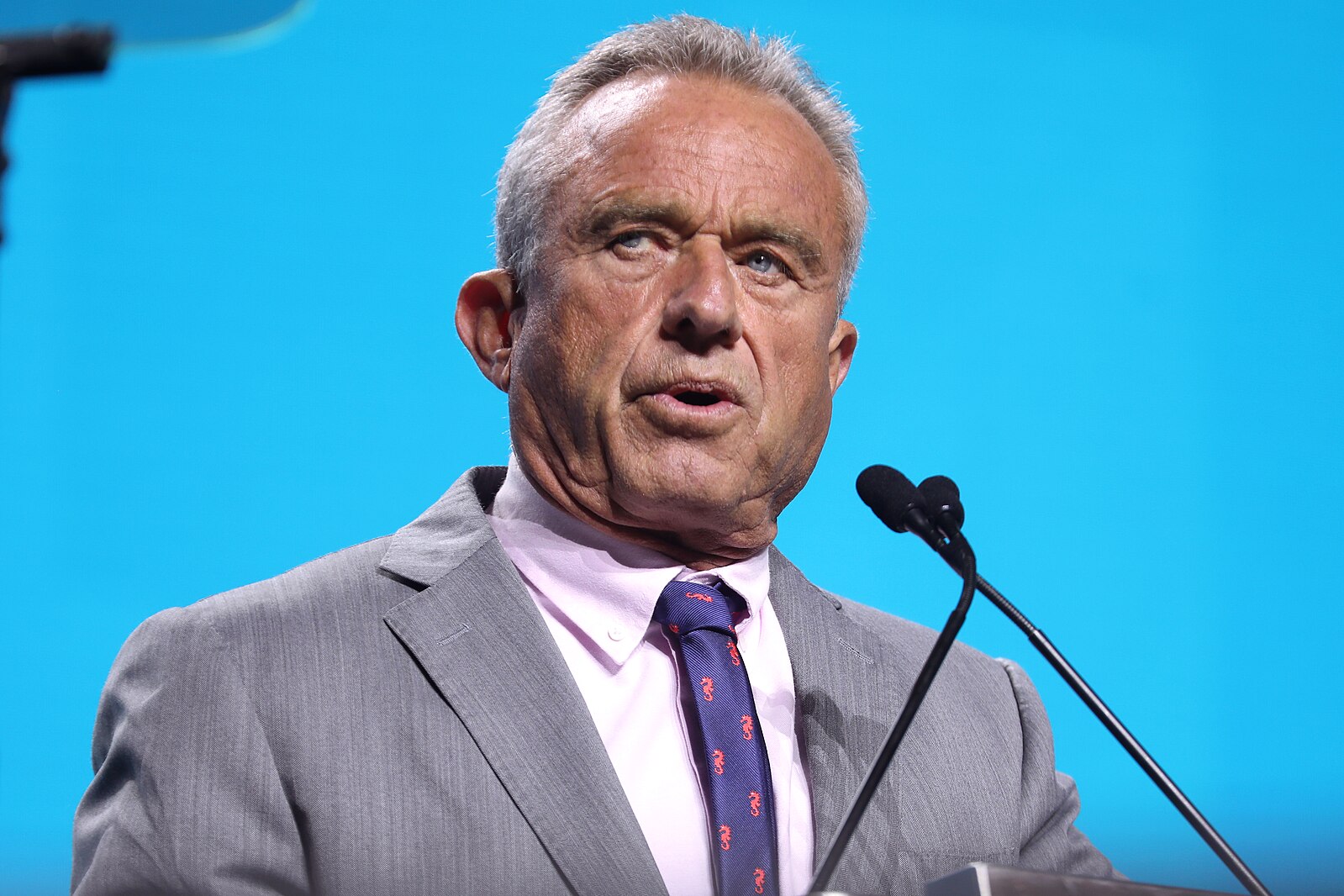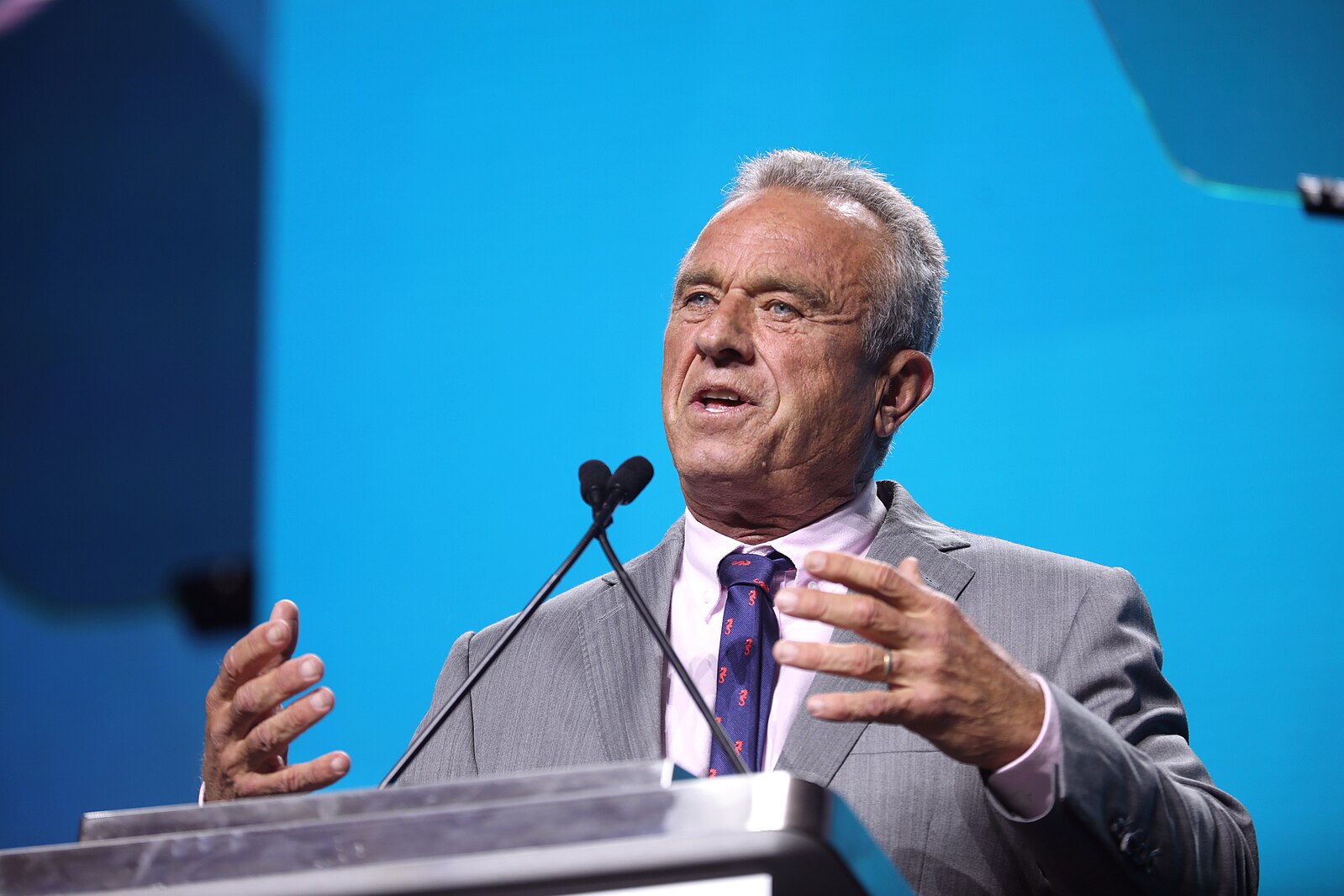U.S. News
25 Ways RFK Jr. May Reduce U.S. Obesity Rates
By Jake Beardslee · December 9, 2024

Here are 25 potential strategies RFK Jr. might employ in addressing this issue: Gage Skidmore / Wikimedia

Addressing the Role of the Food Industry
Kennedy has highlighted the food industry as a major contributor to obesity rates, pointing to the prevalence of ultra-processed, calorie-dense foods that are widely available. He argues that reforming how these foods are manufactured and marketed could significantly reduce overconsumption. Advocates for change suggest this approach could lead to a shift in consumer habits, while critics worry about over-regulation and the impact on industry profits. Kenneth Surillo / Pexels
Reforming School Lunch Programs
One of Kennedy’s proposed measures is to eliminate ultra-processed foods from school lunch programs, replacing them with healthier options. Research has shown that early dietary habits can shape long-term health outcomes, making schools a critical nutritional battleground. This move aligns with broader public health goals but may face logistical and budgetary challenges. Katerina Holmes / Pexels
Taxing Sugar and Fat-Laden Foods
Inspired by successful soda taxes in cities like Berkeley and Philadelphia, Kennedy could propose taxing high-sugar and high-fat foods. Supporters of such measures argue that financial disincentives can curb unhealthy eating habits, while detractors raise concerns about the economic burden on low-income families, who might disproportionately bear the costs. Sebastian Coman Photography / Pexels
Revising SNAP Benefits
Kennedy has suggested limiting the use of Supplemental Nutrition Assistance Program (SNAP) benefits for purchasing sugary drinks and processed foods. This proposal aims to direct government support toward healthier options. While some see this as a pragmatic approach, others argue it may stigmatize recipients and reduce their autonomy in making food choices. United States Department of Agriculture / Wikimedia
Making Healthy Foods More Affordable
To counterbalance measures like taxation, Kennedy could propose using tax revenue to subsidize fresh, whole foods, making them more accessible to low-income households. This dual approach could promote equity in healthy eating, though critics caution that such initiatives require robust funding and oversight to succeed. Wendy Wei / Pexels
Incentivizing Physical Activity
Kennedy envisions expanding Medicaid and Medicare to cover gym memberships and other fitness-related expenses. While this could encourage physical activity among beneficiaries, questions remain about the practicality and cost-effectiveness of such programs on a national scale. William Choquette / Pexels
Strengthening Pesticide and Chemical Regulations
Kennedy has expressed concerns about the impact of pesticides and chemicals used in food production on public health. Revisiting regulatory standards could address potential links to chronic diseases, including obesity, though changes may face pushback from the agricultural sector. Gustavo Fring / Pexels
Expanding Nutrition Education
Kennedy could propose bringing back comprehensive nutrition education in schools as a key strategy, suggesting that empowering children with knowledge about healthy eating habits might yield long-term benefits. While the idea holds broad appeal, the challenge would be finding ways to integrate such programs into already stretched school curricula. Kaboompics.com / Pexels
Recognizing Food Addiction
Kennedy has called attention to the way food companies design products to exploit biological tendencies, creating addiction-like behaviors. However, this perspective may oversimplify the psychological and socioeconomic factors driving unhealthy eating. Andres Ayrton / Pexels
Encouraging Outdoor and Community Activities
Kennedy might envision creating environments that encourage outdoor play and community-based physical activities. Such an approach would align with public health recommendations but would likely require significant investment in infrastructure, such as parks and recreational spaces, to be effective. Kampus Production / Pexels
Regulating Food Marketing to Children
Kennedy could advocate for stricter controls on marketing unhealthy foods to children, a demographic particularly susceptible to advertising. While public health advocates might endorse such a measure, it would likely face opposition from industry stakeholders, who often cite concerns about freedom of speech and economic impact. cottonbro studio / Pexels
Investing in Local Health Initiatives
Kennedy might propose funding community health programs, such as urban gardens and farmers’ markets, to increase access to fresh, affordable produce. While these localized solutions could be impactful, their success would likely depend on consistent funding and active community engagement. Erik Scheel / Pexels
Enhancing Primary Care
Kennedy could highlight the role of primary care in promoting overall health through prevention and early intervention. Enhancing these systems could allow healthcare providers to focus more effectively on long-term health outcomes. However, expanding primary care capacity would require substantial investment in resources and workforce development. Antoni Shkraba / Pexels
Adopting Holistic Health Practices
Kennedy’s interest in integrating holistic health approaches with traditional medicine aims to address the multifaceted nature of obesity. Critics argue that while holistic practices can complement medical treatments, they should not replace evidence-based interventions. Yan Krukau / Pexels
Simplifying Food Labels
Kennedy might support simplifying nutrition labels to provide clear, at-a-glance information, potentially helping consumers make healthier choices. He could advocate for expediting FDA proposals for front-of-package labels, though such changes have historically faced resistance from the food industry. Trounce / Wikimedia
Encouraging Corporate Responsibility
Kennedy calls for greater transparency and ethical practices from food manufacturers. This stance is ambitious but may encounter significant resistance from powerful industry players. Mark Stebnicki / Pexels
Challenging Weight Stigma
Kennedy could address the impact of weight stigma and advocate for a compassionate, evidence-based approach to health. While such a message may find broad support, it would need to be complemented by policies that target underlying factors. Ketut Subiyanto / Pexels
Reevaluating Anti-Obesity Drugs
Kennedy has expressed skepticism about the reliance on drugs like Ozempic, viewing them as temporary fixes that fail to address underlying issues. While his critique may align with calls for systemic change, others warn against dismissing these medications, which have proven effective for some patients. Markus Winkler / Pexels
Promoting Sustainable Agriculture
Shifting subsidies toward sustainable agricultural practices could encourage the production of nutrient-rich foods. Kennedy’s proposal reflects growing interest in environmental health, though implementing such changes would require navigating complex political and economic landscapes. Kindel Media / Pexels
Pushing for Bipartisan Solutions
Kennedy might frame obesity as an issue that transcends political divides, potentially appealing to both Democrats and Republicans. Building bipartisan support could strengthen such initiatives, though navigating the polarized political climate would likely remain a significant challenge. Mikhail Nilov / Pexels
Prohibiting Misleading Food Advertising
Kennedy could address concerns about deceptive marketing tactics used by food companies, particularly those that mislead consumers into believing unhealthy products are nutritious. Tightening regulations on advertising claims has the potential to promote greater transparency and accountability within the industry. Polina Tankilevitch / Pexels
Incentivizing Workplace Wellness Programs
To combat sedentary lifestyles, Kennedy could advocate for workplace wellness programs that encourage physical activity and healthy eating among employees. Such programs might include subsidized fitness classes, nutritious cafeteria options, or flexible hours to accommodate exercise. These initiatives could reduce healthcare costs while boosting productivity. Kaboompics.com / Pexels
Promoting Breastfeeding Education and Support
Kennedy could emphasize the importance of early intervention, such as supporting breastfeeding as a natural way to provide optimal nutrition for infants. Since breastfeeding has been linked to lower rates of obesity in children, his policies might include expanding educational campaigns and access to lactation consultants. RDNE Stock project / Pexels
Fostering Public-Private Partnerships
Kennedy could leverage partnerships between government agencies, nonprofits, and private companies to drive innovation in combating obesity. Collaborative efforts might include creating healthier food options, expanding access to recreational facilities, or launching widespread public health campaigns. Andrea Piacquadio / Pexels
Investing in Rural Health Initiatives
Rural communities often face unique challenges in accessing fresh, healthy food and fitness opportunities. Kennedy could focus on expanding programs like mobile farmers’ markets, community gardens, and telehealth services to bridge these gaps and address health disparities. Kampus Production / Pexels
Shifting the Focus: From Reactive Treatments to Preventive Strategies
The obesity rate in the United States is a complex issue requiring a multifaceted approach. Robert F. Kennedy Jr.'s proposals might aim to shift the focus from reactive measures, such as medications and surgeries, to preventive strategies that tackle systemic causes. These initiatives could include reforms in food production and marketing, improved access to healthy options, and enhanced education about nutrition and physical activity. Polina Tankilevitch / Pexels
Navigating the Challenges of Public Health Reform
Some of Kennedy’s ideas, such as taxing unhealthy foods and restricting advertising, align with public health priorities but raise questions about feasibility, economic impacts, and resistance from industry stakeholders. Proposals like promoting community health initiatives and revisiting agricultural subsidies highlight the intricate connections between health, policy, and the environment, though they would depend on substantial investment and collaboration to succeed. Mark Stebnicki / Pexels

Balancing Food Reform and Medical Interventions
Some public health professionals, however, argue Kennedy’s vision is overly simplistic and stigmatizing. Dr. Angela Fitch, co-founder of Knownwell, criticized Kennedy’s belief that diet and exercise alone can solve obesity "overnight," telling CNN it undermines years of effort to reduce stigma around the condition. Experts also caution that while food reform is essential, dismissing medical interventions ignores their effectiveness. GLP-1 drugs, for example, have demonstrated significant weight loss in clinical trials, providing a valuable tool alongside lifestyle changes. Pixabay / Pexels
Systemic Change vs. Practical Challenges
Kennedy’s approach to reform includes aggressive regulatory measures, such as prohibiting the purchase of soda and processed foods through SNAP benefits. He also proposes taxing unhealthy food to subsidize nutritious alternatives for low-income families. While these ideas align with his focus on systemic change, critics note the complexity of achieving tangible results. Dr. Daniel Drucker, a leading researcher on GLP-1 therapies, highlighted the limits of diet and exercise alone, telling CNN, “The challenge we have is that...people lose a little bit of weight, but not enough to combat obesity rates.” Martin Lopez / Pexels